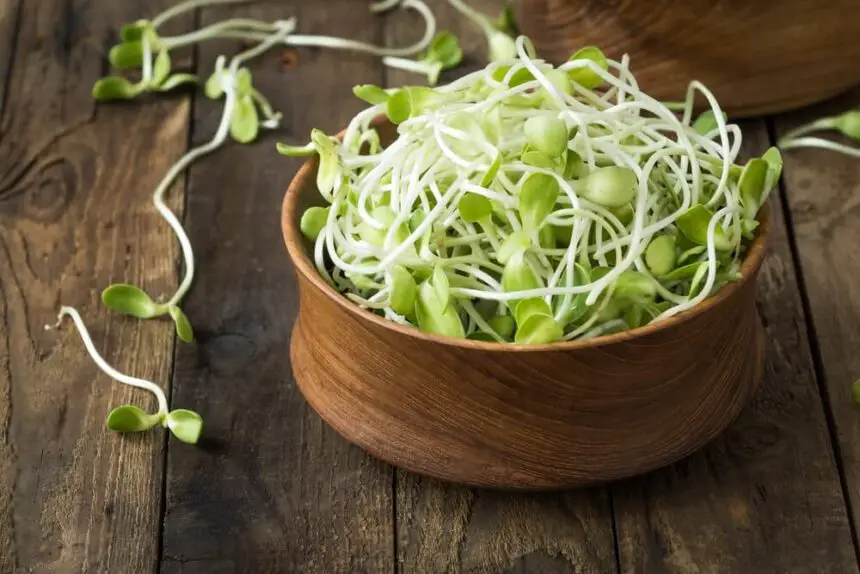So, you’ve got this feline friend, right? The one with the piercing gaze that can make you melt or beg for treats on demand. You’re all about making sure Mr. Whiskers leads a life of luxury, filled with only the finest noms. But here’s the question tickling your curiosity buds: Can cats eat alfalfa sprouts? Let’s dive into this culinary escapade and uncover the secrets of alfalfa for our four-legged buddies.
Alfalfa Sprouts 101: Tiny Green Powerhouses or Kitty Kryptonite?
Let’s start with the basics – what the heck are alfalfa sprouts? Imagine them as the cool kids of the legume world. Alfalfa, part of the pea family, gives birth to these sprouts, little green warriors that emerge before blossoming into adulthood. Tiny clover leaves on slender shoots, they’re like the Instagram influencers of the plant world – recognizable, vibrant, and ready for the spotlight.
But before you start tossing these green gems into Fluffy’s food bowl, let’s talk nutrition. One cup of alfalfa sprouts is like a nutritional fairy tale with just 8 calories but a mighty punch of vitamins and minerals. We’re talking Vitamin K for bones and blood clotting, Vitamin C for a superhero immune system, and a sprinkle of minerals for overall body harmony.
Can cats eat alfalfa sprouts?
Now, let’s address the elephant – or should I say, the cat – in the room. Can cats eat alfalfa sprouts? Well, buckle up, because it’s a bit of a culinary rollercoaster.
Fiber Fiesta:
Picture this: your cat, lounging like a queen, contemplating the mysteries of the universe. Alfalfa sprouts can be her ally in the war against constipation. The high fiber content helps the digestive journey, ensuring everything moves like a well-choreographed ballet.
Vitamins and Minerals Extravaganza:
These sprouts aren’t just a pretty face. They bring Vitamin K to the bone party, Vitamin C to the immune bash, and a bunch of minerals for an all-around body fiesta. Your cat could benefit from this nutrient extravaganza, but here’s the plot twist – moderation is the name of the game.
Kitten Chronicles:
Hold your horses! If you’ve got a mini-feline version prancing around, alfalfa sprouts aren’t the sidekick they need. Kittens are like baby Yodas – vulnerable and still figuring out this crazy world. Wait until adulthood knocks on the door before introducing them to the alfalfa feast.
Storing the Green Magic: Keeping It Fresh
You’re sold on the alfalfa idea. But hey, magic needs the right wand, and alfalfa sprouts need the right storage.
- Layer and Seal:
- Place those green wonders between paper towels.
- Seal the deal in a plastic bag.
- Toss them in the fridge – the VIP section for all things fresh.
- Sniff Test:
- Ever had a carton of milk playing detective with your nose? Same deal with sprouts.
- If it smells funky or feels slimy, bid them farewell. Freshness is the secret sauce.
The Fear Factor: What’s Spooking Cat Owners?
Now, let’s talk about the whispers of fear echoing in the cat-loving community. Saponins and phenols – sounds like potions from a wizard’s cauldron, right?
The Saponin Showdown:
For us humans, saponins are the Avengers of the plant world, fighting off villains like cancer and cholesterol. But hold your horses – in Catland, they’re considered the Jokers, causing digestive havoc. Diarrhea and vomiting, anyone?
The Phenol Paradox:
Phenols, the antioxidants humans adore, take a dark turn in cat tales. These superheroes-turned-villains can unleash chaos in a feline stomach, leading to a digestive rebellion.
Bacterial Boogie:
Alfalfa sprouts aren’t just innocent greens; they can be a playground for bacteria. If those seeds were already carrying nasty bacteria, it’s like inviting the villain to the superhero party. The result? Food poisoning and a sick kitty.
Cat + Alfalfa Sprouts Equation: Solving the Mystery
Now, let’s decode the equation – how much alfalfa is too much for your furball?
Veto from the Vet:
Always consult the wise wizard – your vet. Before you embark on this culinary adventure, get the green light from the vet’s magical staff.
Slow and Steady:
Introduce alfalfa sprouts to Fluffy’s menu like a skilled chef unveiling a new dish. Start slow, watch for reactions, and let your cat savor the novelty.
Alternative Greens:
If alfalfa isn’t Fluffy’s cup of tea, don’t despair. There’s a buffet of alternatives – wheatgrass, oat grass, barley grass – all ready to be the leafy distraction your kitty craves.
Wrapping Up the Alfalfa Saga
In conclusion, can cats eat alfalfa sprouts? Absolutely, but in the moderation dance. Alfalfa is like the secret ingredient in a cat’s gourmet menu, adding flair without stealing the spotlight. So, let your cat nibble on the alfalfa stage, but keep an eye on the cues – vomiting, diarrhea, or a general disdain for the green scene.
Remember, alfalfa sprouts are the supporting actors, not the main characters, in your cat’s culinary story. Follow the storage rituals, respect the kitten embargo, and consult the cat oracle (aka, the vet) for a purr-fect dining experience.
As we wrap up this alfalfa saga, let’s celebrate the leafy greens that bring a touch of nature to our feline friends’ lives. After all, life’s too short to not savor a bit of alfalfa magic, one nibble at a time.


